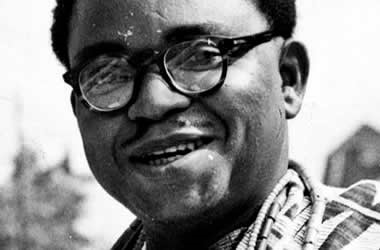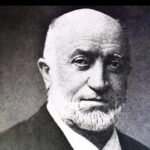ENAHORO, ANTHONY EROMOSELE
- 4 Min Read
Anthony Eromosele Enahoro was a Nigerian nationalist, journalist, pro-democracy activist and politician. He is considered one of the heroes of Nigeria’s independence movement.

PHOTO CAPTION: Anthony Eromosele Enahoro. SOURCE: talkafricana
He was born on the 22nd of July, 1923 in Onewa village, Uromi, in present-day Edo State of Nigeria. His parents were Anastasius Asuelinmen “Okotako” Enahoro and Fidelia Inibokun née Ogbidi Okojie. He was educated at Government School, Uromi; Government School, Owo, (in Ondo State); and King’s College, Lagos. While a student at King’s College in the 1940s, he became a student leader and led several anti-colonial protests.
He was twice jailed for sedition by the colonial government, for an article mocking a former governor, and then for a speech allegedly inciting Nigerian troops serving in the British army. The British marked him as a firebrand, but even as he was jailed for a third time, he was beginning to reassess his position.
In 1944 at the age of twenty-one, Anthony Enahoro met Nnamdi Azikiwe who sent him from Lagos to Ibadan to edit his newspaper, the Southern Nigerian Defender, making him Nigeria’s youngest ever newspaper editor. He was also editor of the Daily Comet from 1945 to 1949; assistant editor of the West African Pilot (based in Lagos and previously edited by Azikiwe) from 1950 to 1952; and editor-in-chief of the Morning Star (based in Sapele, Delta State) from 1950 to 1953.
In 1950 he and Arthur Prest founded the Mid-West Party. Enahoro had already started the Mid-West Press and he published the Nigerian newspaper from 1950 to 1953. The Mid-West Party became part of the Action Group in 1951. In 1953, Chief Enahoro became the first to move the motion for Nigeria’s independence which was eventually granted in 1960 after several debates and setback in parliament. Chief Enahoro is often regarded by academics and many Nigerians as the “Father of Nigeria State”.
During the 1962 crisis in the old Western region, he was detained along with other Action Group members. Accused of treason during the Awolowo alleged coup trial, Enahoro escaped via Ghana to the United Kingdom in 1963, Nigeria requested Enahoro’s extradition under the 1881 Fugitive Offenders Act, preventing his application for political asylum.
Early in 1963, the new leader of the Labour party, Harold Wilson, detected the embarrassment caused by Enahoro’s arrest and imprisonment. Labour went on the attack in the Commons, with support from some Tories, backed by a media furore. He was once one of the best-known Nigerians in Britain. He was the “fugitive offender” who triggered days of debate in the House of Commons in 1963 as he battled against extradition.
“The Enahoro affair” became an issue of human rights versus the government’s pusillanimous wish not to offend Nigeria, and put the Tory prime minister, Harold Macmillan, and his home secretary, Henry Brooke, in a difficult position. He was extradited from the UK and imprisoned for treason. In 1966, he was later released by the Military Government.
During the Nigerian crisis that followed the 1966 coups, Enahoro was the leader of the then Mid-West delegation to the Ad Hoc Constitutional Conference in Lagos. He later became Federal Commissioner (Minister) for Information and Labour under the General Yakubu Gowon Military Government, 1967–74; Federal Commissioner for Special Duties, 1975. He later became a member of the National Party of Nigeria, NPN, 1978–83. He was the president, World Festival of Negro Arts and Culture, 1972–75.
Enahoro was the chairman of the National Democratic Coalition (NADECO), a pro-democracy group that fought Dictator Sani Abacha till Abacha’s death. Enahoro was conferred with the national honour of Commander, Order of the Federal Republic, CFR, in 1982, and is the chairman of the Movement for National Reformation, MNR; as well as the Pro-National Conference Organisation, PRONACO. He was awarded honorary DSC by the University of Benin in 1972. His publications include the treatise Fugitive Offender. Enahoro played golf and followed cricket ardently.
Enahoro died on December 15, 2010 after a protracted battle with diabetes at his residence in Benin.
OLA OGUN




